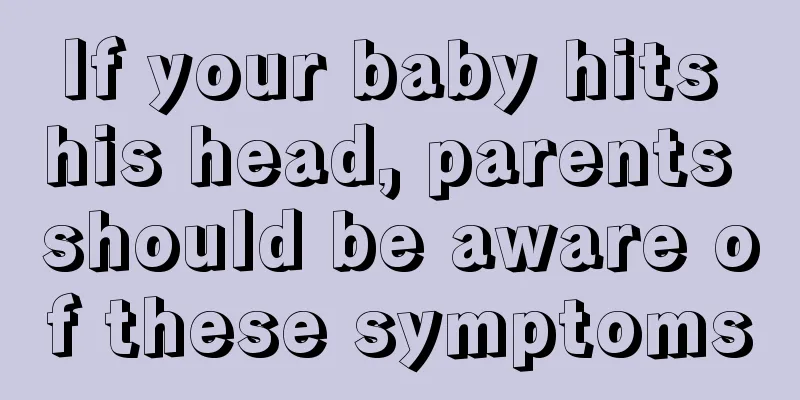What should I do if my baby has mild pneumonia?

|
Pneumonia is a common disease among our babies. It is also a relatively lethal disease. The baby's body is very fragile and has low immunity. Therefore, the baby's health is worthy of our parents' attention and protection. So what should we do if our baby has mild pneumonia? We parents must learn the following life tips for treating pneumonia. 1. Ensure adequate rest and sleep to alleviate breathing difficulties. During the illness, the baby's body is weak, and sufficient rest is conducive to recovery. The baby should be allowed to rest in bed as much as possible. You can gently turn your baby over every 2 to 3 hours, alternating between lying on his back and lying on his side, and gently pat the baby's back to prevent prolonged pressure on one part of the lungs, which is beneficial for the discharge of phlegm and the absorption of inflammation. For babies with severe breathlessness, it is advisable to put them in a sloped lying position with their head and upper body raised, which can alleviate breathing difficulties. You can pick up a small baby and pat his back. The baby's nasal crusts and nasal secretions should be cleared in time. When there is phlegm that hinders the child's breathing, the baby should be allowed to cough up the phlegm. If the baby cannot cough, the phlegm should be sucked out to keep the respiratory tract open. 2. Maintain a good living environment Keep the air in the bedroom fresh, open the windows frequently, and ventilate the room. If the wind is strong, be careful not to let your baby catch a cold. Choose a sunny day to open the windows for ventilation. If the room is stuffy or has an odor, take care to dispel the smell. When opening the window, be sure to close the door to avoid convection wind. The room temperature should be maintained at 18℃ ~ 22℃ and the humidity should be maintained at around 60% to provide the baby with a comfortable breathing environment and help cough up phlegm. 3. Be careful when taking medications. It is best to follow the doctor's advice when taking medications. Pneumonia is an inflammation caused by pathogens invading the lungs. Moreover, pneumonia is not only caused by bacteria. Many cases of pneumonia are also caused by pathogens such as viruses, mycoplasmas, fungi, or by allergies. The misuse of antibiotics not only fails to achieve the therapeutic effect, but also causes various adverse reactions. The correct approach is to follow the doctor's analysis and choose the appropriate medication. Some babies will have fever when suffering from pneumonia, and parents will give them antipyretics, thinking that this will be the solution. In fact, this is incorrect. You must also take antiviral drugs and antibiotics. Because colds are caused by infections such as viruses or bacteria. Antipyretics can only relieve fever symptoms and do not have antibacterial or antiviral effects. Therefore, antipyretics can neither prevent colds nor pneumonia. 4. Nutritional configuration should be reasonable Give your baby nutritious and easily digestible food according to his age. Breastfeeding babies should mainly drink milk, but can drink appropriate amounts of water. The milk can be diluted by adding some water, and the baby can be fed less each time and more frequently. If choking occurs, clear the milk in the nostrils immediately. Babies who are older and can eat can eat nutritious and vitamin-rich, easy-to-digest, light food, eat more fruits and vegetables, and drink plenty of water. The above points are all things that must be done in life. Only by doing the above points can our baby's mild pneumonia recover faster and more thoroughly, and can also prevent the trouble of pneumonia next time. Have we learned the above tips for preventing and treating baby pneumonia in life? These can be of great help to our babies. |
<<: What are the reasons why babies cry and don't sleep at night?
>>: What to do if your baby's butt is red
Recommend
Can children be given a bath in the emergency room?
Roseola infantum is a skin disease with a relativ...
What kind of milk is good for children to drink before bedtime?
Milk is a very nutritious food. Many dairy produc...
What characteristics does the baby inherit from his parents?
When looking for a partner, look for someone who ...
One year old baby's O-shaped legs
For a one-year-old baby, it is the stage of learn...
Is it normal for a child to have a vision of 0.8?
Myopia is a very common problem. Nowadays, the nu...
What are the causes of crying when sleeping in eight-month-old baby?
In fact, mothers need to take good care of their ...
What should I do if my baby keeps sneezing? Parenting experts introduce effective methods
For ordinary adults, sneezing occasionally is nor...
Blisters on the buttocks
Many people may not be familiar with the situatio...
What should I do if my child has shortness of breath?
Breathing is essential for people to survive. If ...
Causes of white tongue coating in infants
Many mothers will notice that their children beha...
Baby crying hoarse voice
When a baby starts crying, he will cry at the top...
How is asthma diagnosed in children?
Asthma is a common disease that can occur in chil...
What to do if a three-year-old child has phimosis
Most children have phimosis from birth. For many ...
What should I do if my baby has diarrhea and poops green?
We found that many babies' stools are sometim...
There is a small white spot on the baby's face. What is going on?
Sometimes you will see one or two white spots the...









